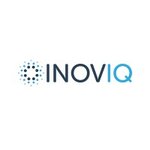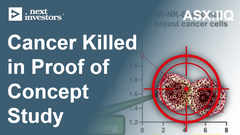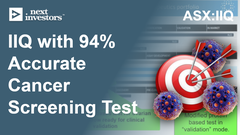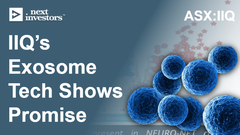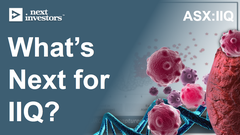Our New Investment is Inoviq (ASX: IIQ)
Disclosure: S3 Consortium Pty Ltd (the Company) and Associated Entities own 1,150,000 IIQ shares and 575,000 IIQ options at the time of publishing this article. The Company has been engaged by IIQ to share our commentary on the progress of our Investment in IIQ over time. Some shares and options may be subject to shareholder approval.
They say that in life there are four things that eventually will kill you.
Cancer, heart disease, diabetes or Alzheimer's.
Diagnosing and then treating these afflictions is a major challenge for the human race.
We have just Invested in an early stage biotech company that is developing technologies that targets TWO of these leading causes of death.
With a three pronged attack that involves a big moonshot treatment, an existing product in market and a near-commercialisation diagnostics product.
Our new Investment Inoviq (ASX:IIQ) is at the forefront of a new frontier in biotechnology.
IIQ is developing an exosome platform technology with far reaching implications across a range of diseases.
What is an “exosome”?
More on that in a minute...
IIQ is our fourth biotech investment where we have followed expert biotech investors the Merchant Group.
Merchant Group is the biggest shareholder in IIQ.
Three of the four current IIQ board members come from Polynovo.
For those who don't know... Polynovo is an ASX biotech success story and is currently capped at $1.7BN.
Between 2015 and 2021 its share price went from ~4c to ~$4 - up 10,025%.
Merchant was also an early investor in Race Oncology which went up ~2,900% (low to high) and again, Polynovo which was up ~10,025% at its highest point.
Merchant also led the cornerstone raise for a few other companies in our Finfeed Biotech Portfolio:
- Dimerix - Up nearly 10x over the last 12 months and one of the best performing Investments in our portfolio
- Arovella Therapeutics - Up over 400% in the last 24 months and the best performing stock in our Portfolio last year
- Neurotech International - High point of nearly 200% from our Initial Entry Price, currently up 65% from our Initial Investment.
We don’t often Invest in new biotech stocks (only about one each year), but we are hoping that this Investment will continue our biotech success.
The past performance is not and should not be taken as an indication of future performance. Caution should be exercised in assessing past performance. This product, like all other financial products, is subject to market forces and unpredictable events that may adversely affect future performance.
A big part of the reason we like biotechs is that they are a part of the market where there is the potential to find companies that can deliver 1,000%+ returns.
The upside for early backers investing in biotech opportunities is that when a company gets it right, treatments can be life-changing for shareholders and life-saving for patients.
However, developing technology in the life sciences space is capital intensive, and carries with it a lot of risks, risks which we have identified, understood and accepted.
(we list these risks in our IIQ Investment Memo that we are launching today)
The potential returns is why early stage biotech stocks fit our high-risk, high-reward investment strategy, as part of a diverse small cap portfolio.
Today, we are adding IIQ to our Portfolio.
IIQ is working with a technology centred around “exosomes” in the human body.
What is an exosome?
Exosomes are teeny, tiny parcels (about 100 times smaller than a cell) that carry messages between cells in the human body.
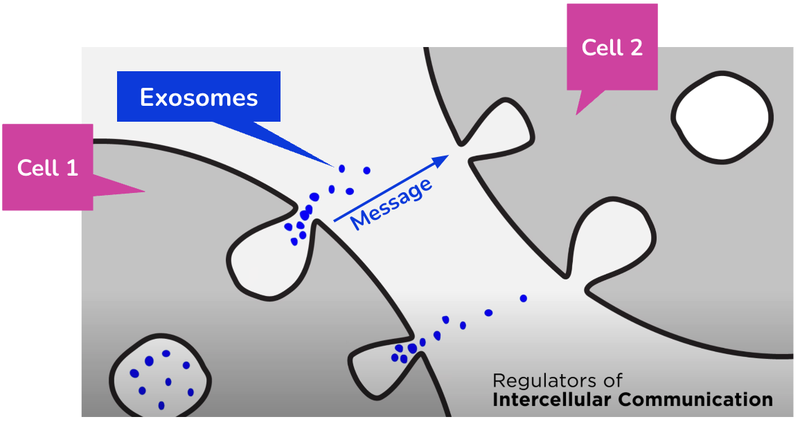
Think of exosomes as the “couriers” or “postmen” to messages being delivered around the human body.
They pick up and drop off messages (biological information) to different parts of the body which triggers tailored responses from different cells...
Why do cells in the human body need to send messages to each other?
- Healing a cut: When you get a cut or scrape, your body needs to repair the damaged skin. Exosomes released by cells in the area of the injury carry instructions to other cells, telling them to start the healing process. Some exosomes tell cells to multiply and create new skin, while others carry signals to stop bleeding and fight off any germs that might cause an infection.
- Fighting diseases: Our immune system uses exosomes to communicate with different types of cells when there's an infection or disease in the body. For example, when you have a cold, some of your immune cells release exosomes that carry messages to other cells, instructing them to produce more antibodies to fight off the virus. There are many cases where exosomes know about a disease but the immune system can’t fight it.
- Brain communication: Our brain is protected by a special barrier called the blood-brain barrier, which prevents many substances from entering the brain. However, exosomes can cross this barrier and deliver messages to cells in the brain. For instance, exosomes released by cells in other parts of the body can carry instructions to brain cells, helping to regulate mood, memory, and other important functions.
- Growth and development: As we grow and develop from babies to adults, cells in our bodies use exosomes to communicate with each other and coordinate the various changes that need to happen. For example, exosomes released by bone cells can carry messages to other cells, telling them to produce more bone tissue or strengthen existing bones.
Now imagine if you could snoop on what’s inside these messages... or even change the instructions in the messages that are being delivered...
So how is IIQ using messages sent between cells to detect and treat diseases?
Another way to think of exosomes is as the postal service of the human body.
Exosomes know the “address of the sender”, the content of the mail being sent AND the “address of the recipient”.
Particular Exosomes will hold information about the existence and location of any issues in the human body.
IIQ’s technology is the equivalent of being able to quickly and accurately identify problems in the human body by “reading the mail” that is getting sent between cells.
And once IIQ can identify any potential disease by snooping in on what cells are telling each other, IIQ can edit or add instructions to “the mail” - instructions and the tools to fight the issue at the exact location where it is.
This is because the exosome is still planning to “deliver the mail” to the recipient cell where the problem is located.
So the potential for treatment delivery using exosomes is huge.
(Assuming this can be proven out in preclinical and then clinical trial data)
The blue sky for IIQ is figuring out “which mail to read” to diagnose various different diseases.
And then can determine what treatments to “attach to the mail” which will then get delivered right into the disease cell's mailbox.
IIQ's initial non-exosome based tests are for breast cancer and ovarian cancer.
But, with an exosome based test and eventually (we hope) a safe and effective exosome based therapy - it might be possible to both diagnose and treat breast cancer, both with exosomes. (corrected 14/06/24)
This morning IIQ also announced that they may have figured out how to “read the mail” to identify the presence of Alzheimer's disease.
A significant new development leveraging exosomes carrying messages from the brain to the cells in the body.
At a very high level, the ability to pick up and drop off specific information is why we think IIQ’s exosome technology can develop strong diagnostic products (picking up info) and therapeutic treatments (dropping off info).
IIQ has three different business applications for its exosome technology:
- Research Tools (US$661M market size) - An exosome-based tool used by researchers to enable biomarker discovery (identifying diseases) and validation (supporting the research of new treatments).
- Diagnostic Products (US$6.1BN market size) - Exosome and non-exosome based tests for screening and monitoring various conditions including breast cancer and ovarian cancer. (corrected 14/06/24)
- Therapeutics (US$55.3BN market size) - A “weaponised” exosome engineered to target and treat solid tumours.
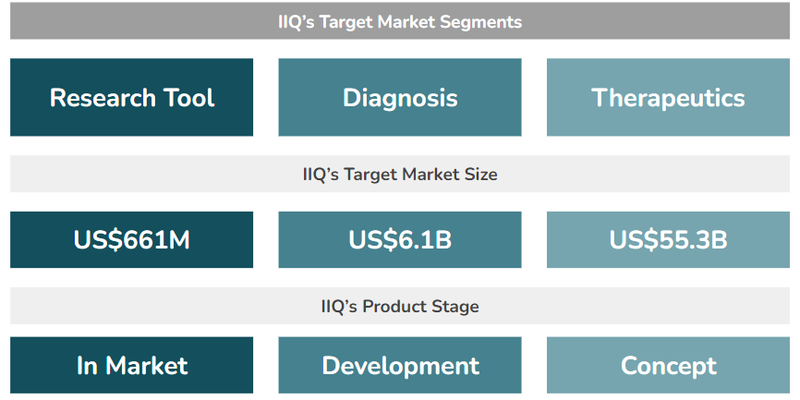
This week, IIQ closed a placement to raise $7M at 50c per share.
We participated in this placement.
Introducing our latest portfolio addition:
Our new Investment Inoviq (ASX:IIQ) is at the forefront of a new frontier in biotechnology.
IIQ is developing an exosome platform technology with far reaching implications across a range of diseases.
Exosomes are tiny parcels that carry messages between cells.
IIQ is developing technologies using exosomes to both diagnose (find what’s wrong) and treat (fix what’s wrong) various conditions.
It has various products at various different stages of development, but the there are some key highlights from its technology:
- A breast cancer test that detects 19% more breast cancers than the current FDA approved test.
- A breast cancer therapy that kills 75% of breast cancer cells in 72 hours (test tube).
- Work ongoing for tests across ovarian cancer, and neurodegenerative diseases like Alzheimer’s.
- An in-market exosome isolation tool for other companies working with exosomes, already generating revenue
We have been following IIQ for years now (since back in 2016 when it was called Bard1 Life Sciences) and we think that now is the time for us to make an Investment in this company.
Why? Well, here are the 9 key reasons why we invested in IIQ:
The 9 key reasons we Invested in IIQ:
- Going after big markets with potential breakthrough technology - IIQ is developing a technology that will detect cancer and possibly neuro diseases like Alzheimer’s. These are big markets and its platform technology could capture the interest of Big Pharma if it is able to prove that it works in a clinical setting.
- Strong board - the team from success story Polynovo - IIQ has three directors who are all with or previously with Polynovo, one of the great ASX biotech success stories of the last decade. Polynovo re-rated from ~4c to ~$4 in the space of 4 years and it remains capped at ~$1.7BN at the time of this memo.
- Merchant Funds Management are the biggest shareholder - Merchant is IIQ’s biggest shareholder holding ~14% of the company. Merchant has had a lot of success investing in Biotechs including - Race Oncology which went up ~2,900% (low to high) and the IIQ’s board other company Polynovo, up ~10,025% at its highest point.
- Platform technology to deliver multiple “shots on goal” - IIQ is somewhat different to a lot of biotechs out there in that its exosome technology platform doesn’t limit it to a binary outcome on a single clinical trial, if one catalyst doesn’t work out, there are more to look forward to.
- Tight cap structure - With just ~106M shares on issue and Merchant holding ~14% and Chairman David Williams holding ~5% there aren’t many shares floating around. This generally means that with fewer shares in the market, it’s more likely to re-rate on major news.
- IIQ’s breast cancer test is more accurate than leading test - A recent clinical validation study of IIQ’s breast cancer test showed that it detected 19% more breast cancers than the leading test (CA15-3 test by $332BN Roche) with an impressive 81% sensitivity and 93% specificity across a range of breast cancers.
- Early stage moonshot to treat solid tumours - IIQ is also advancing a solid tumour therapy which has been shown to kill 75% of breast cancer cells in 72hrs in an in vitro (test tube) study. There is a huge unmet need for treatments in the solid tumour space where, so far, cell therapies haven’t been developed.
- Expansion of tests to include ovarian cancer and neurodegenerative diseases (Alzheimer’s) - IIQ is looking to apply its exosome platform technology to ovarian cancer, and more recently has been working on neurodegenerative diseases such as Alzheimer’s. A blood test for the early detection of Alzheimer’s would be a major scientific advancement.
- Large commercial opportunities from underlying technology - IIQ has an exosome isolation product which is already being sold to research groups. IIQ also has commercial agreements with Promega and a European biotech to bring IIQ’s exosome platform technology to market. Because IIQ’s exosome technologies can be applied to diagnosing and potentially treating many different diseases, we expect to see more partnerships where IIQ licences their exosome tech.
What’s an exosome? Here’s an analogy...
At a very high-level exosomes are naturally occurring delivery messengers between cells.
Below is a concise video which summarises what exosomes are and how they work:
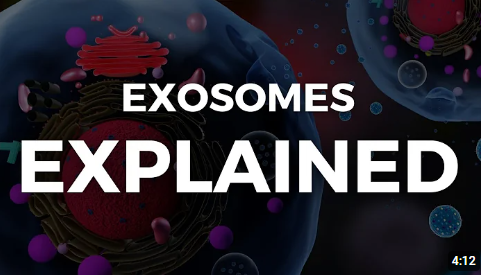
(Source)
IIQ has developed a technology platform to isolate, concentrate (enrich) and engineer exosomes.
Again, think of exosomes as the postal service in the human body - they deliver packages with precise instructions and information, helping cells communicate.
As a result, they can also act as a sort of cellular Border Force - finding out where the bad guys are (cancer and other diseases) and what they are up to.
But because they travel around so much and can move between cells - it is believed that they can also deliver powerful therapies that can kill bad guys (cancer and other diseases) as well.
A good guy that has access to the bad guy's conversations - and can also bring the bad guy to justice.
Maybe a cancer-informant à la Leonard Di Caprio’s character in The Departed?
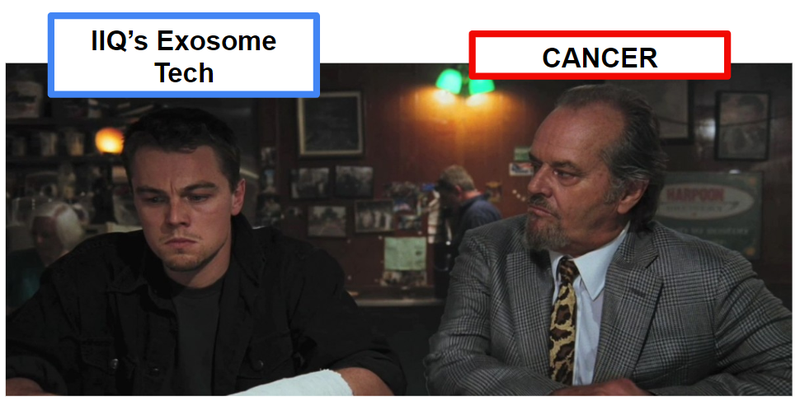
It’s a powerful idea.
Control the “messenger,” find out what’s happening in the cell AND (hopefully) get the messenger to deliver potentially life saving therapies.
That’s what IIQ is showing its technology is capable of doing.
In terms of diagnostics this means earlier detection and better care delivery.
In terms of therapies - this is still very much a new frontier - but it could mean far more targeted delivery.
We’ve had great success with another preclinical cancer therapeutic company - Arovella Therapeutics which also does work on alternatives to chemotherapy.
IIQ is at an earlier stage than Arovella with its solid tumour (breast cancer) therapy, meaning it hasn't been tested on mice yet - but an early in vitro (test tube) study showed that IIQ’s therapy kills 75% of breast cancer cells in 72 hours.
IIQ’s therapy shapes as a way to potentially cut out the nasty side effects of chemotherapy - which we think is the equivalent of burning down the house to kill a cockroach.
The market size for cancer therapeutics is big (~US$55BN).
And there are lots of biotech companies in the market looking to develop technologies in this space.
Arovella for instance, is a cell therapy company.
The most common form of cell therapy is CAR T therapy, which is good at targeting blood cancers but not so good at targeting solid tumours.
Solid tumours make up 90% of all cancers in adults and are the “final boss” for cell therapy platforms.
Where exosomes have an advantage over CAR T therapies is in their size.
Exosomes are tiny “sacs” that range between 30 to 150 nanometers in size.
Which is nearly 100 times smaller than a cell.
Because the exosomes are so small, the theory is that they will be able to breach into tumours and kill them:

(Source)
Long thought about theoretically in academia - IIQ is now doing it.
This is the blue sky bet that IIQ will look to advance over the next few years, and this is where it fits into IIQ’s overall product pipeline:
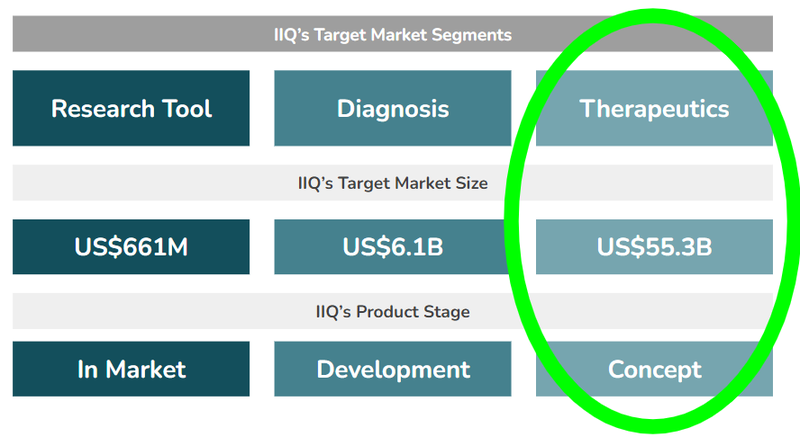
But IIQ has a more advanced product in the diagnosis stage of development.
IIQ breast cancer test - in market next year?
IIQ is also developing tests to screen, diagnose and monitor breast cancer and ovarian cancer.
Screening is a very important part of the cancer detection process.
The earlier that the cancer is detected, the earlier that the patient can get treatment and prevent the cancer from spreading.
For those that have undergone treatment, it is important to monitor whether the cancer returns and if further treatment is needed.
Monitoring generally occurs four times a year for patients via a blood test.
The market size for screening and monitoring for breast and ovarian cancers is around US$6.1BN and is led by a big pharma company called Roche (which is capped at US$200BN).
Earlier this year IIQ published the results of its “monitoring study” to evaluate whether its breast cancer test called SubB2M, fared relative to Roche’s product.
Roche’s product is called CA15-3 II and is the incumbent in the market.
IIQ was able to show that its product outperformed Roche’s by identifying 19% more breast cancers.
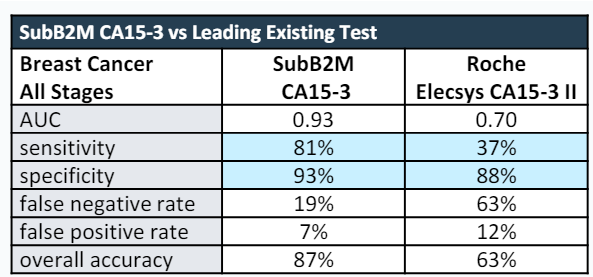
IIQ is hoping to get a monitoring test for breast cancer on the market by the first half of 2025... but there are a few milestones that it will need to pass to get there.
There is a history of big pharma deals in the diagnosis space.
In particular the acquisition of Biotechne in 2018, which was acquired for up to US$575M for its exosome-based prostate testing platform:
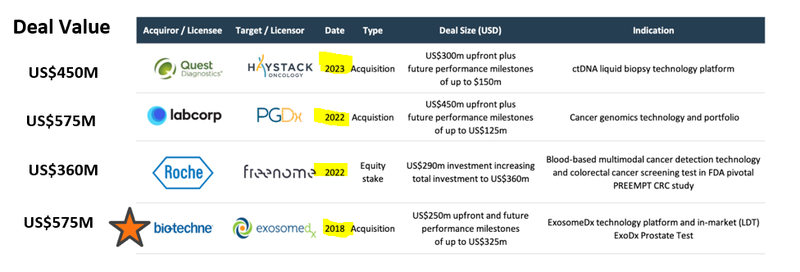
We note that the deal between Biotechne and Exosomedx was primarily for the company’s exosome technology and a prostate test, there wasn’t very much happening on the therapeutics side.
We are hoping that as IIQ develops its diagnosis platform through to commercialisation, it catches the eye of a big pharma company looking to enter the space.
Here is what the pipeline looks like for IIQ’s diagnosis products:

We are interested to see how IIQ can develop its “screening” tool for Ovarian Cancer, although there is a market for Monitoring cancer, Screening is where the big money is made.
Here is where this fits into IIQ’s overall product pipeline:
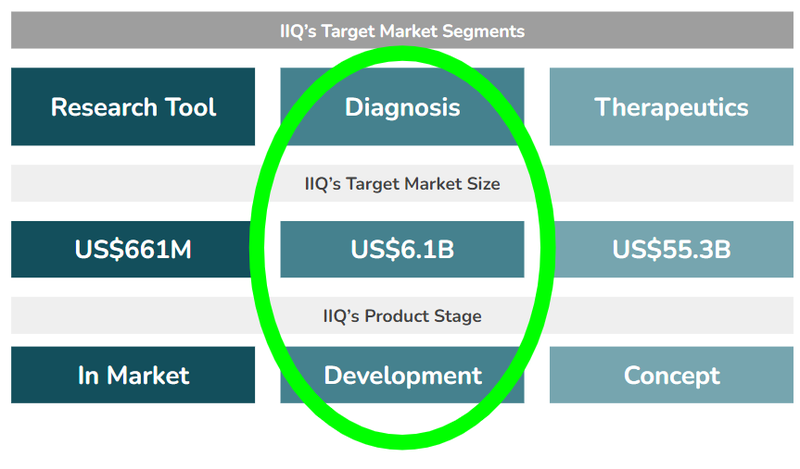
IIQ is delivering revenues right now
IIQ has a technology called EXO-NET which is used by researchers (think universities, clinical trial labs, R&D departments in big pharma) to help with drug development.
The technology are a set of tools for isolating exosomes to identify and validate various biomarkers which are naturally occurring biological material that helps identify certain diseases.
The building blocks of exosome diagnostics - which other companies are working on.
These tools are used by researchers to develop drugs or evaluate the effectiveness of a drug within a clinical trial.
IIQ has three commercial partnerships in place to drive revenue for this product that is already in market:
- Supply and distribution deal with Promega (established global sales, marketing and distribution capabilities)
- Licence Agreement with ResearchDX (US-based diagnosis organisation)
- Fee-for-service agreement with European Biotech
This is what the product looks like.
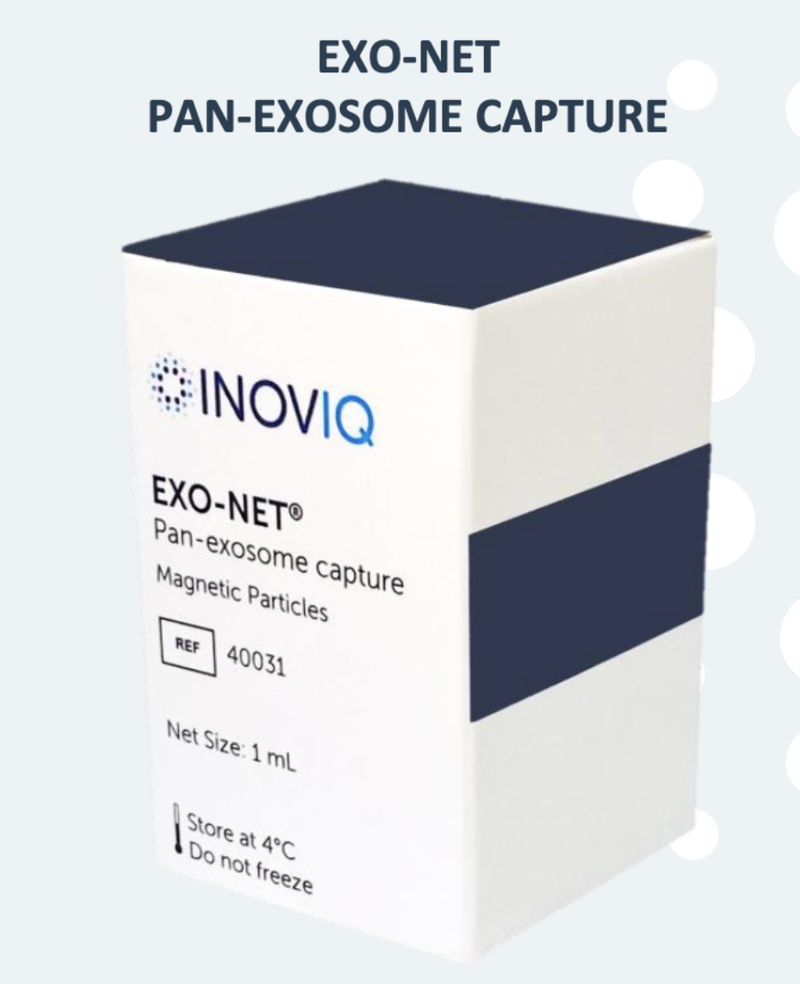
Last quarter IIQ generated $119K of sales revenue from the product.
Although this is small, there is a chance that IIQ signs some larger licensing or distribution deals that could make a meaningful difference to the company’s balance sheet.
Ultimately, we are Invested in IIQ for the diagnosis and treatment development, and see this as a “side bet” that could prove handy if bigger contracts are signed.
Here is where it fits into IIQ’s product pipeline:
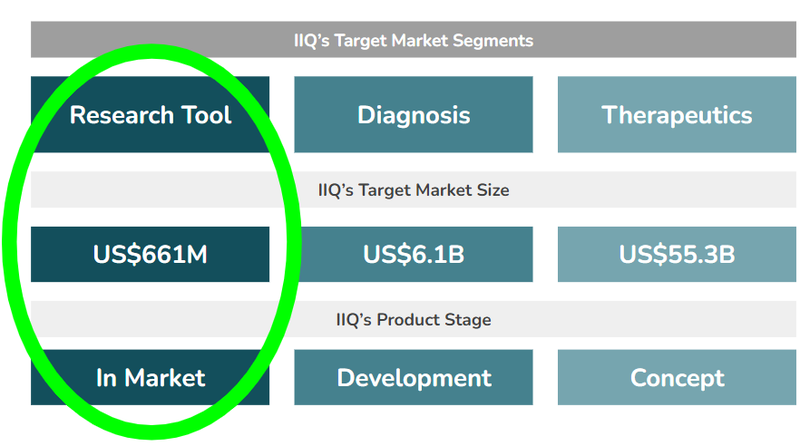
IIQ is targeting Alzheimer’s disease and other neurogenerative disorders
The final moonshot technology that we are hoping to see IIQ develop is its NEURO-NET product that isolates brain-derived exosomes.
Today IIQ published the results from its validation study on Alzheimer’s Disease which showed that its product was able to identify known biomarkers that were not identified by other isolation methods.
Because of their tiny size, exosomes are able to cross the “blood-brain barrier” and provide a fingerprint of the health or disease status of the brain.
This is a big achievement and we hope that it leads to the development of treatments that can better detect diseases like Alzheimer’s.
The size for the Alzheimer’s therapeutics market is set to double to US$8.2BN by 2032:
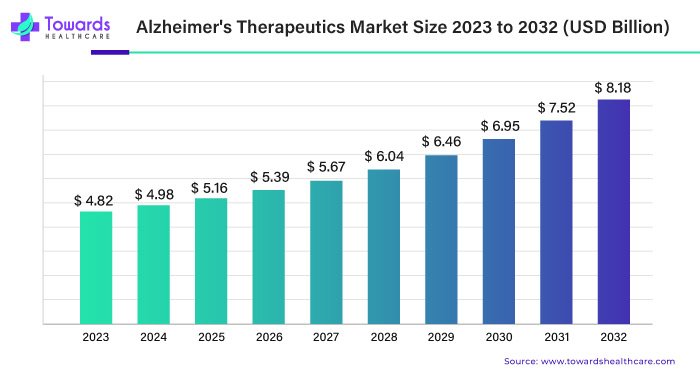
IF IIQ’s product is able to test for the early detection of Alzheimer’s disease OR support in the research of a treatment, it would be a major scientific advancement that would be of interest to big pharma.
With this new development we think that IIQ has optionality when it comes to which business segment it fits into.
Right now, it is firmly in the “research” space, however it would be a big win if IIQ could develop a product in the diagnosis segment:
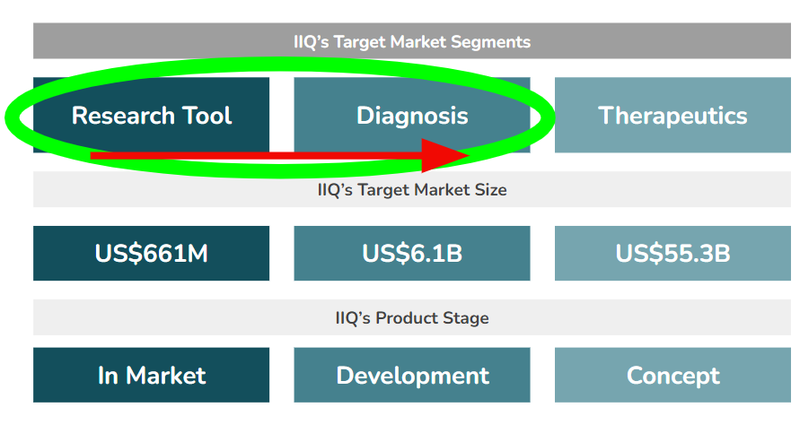
We think this is another high-reward / moonshot opportunity that is difficult to find on the ASX.
What we’re looking for next from IIQ...
Here is a breakdown of IIQ’s products and the various stages of development:
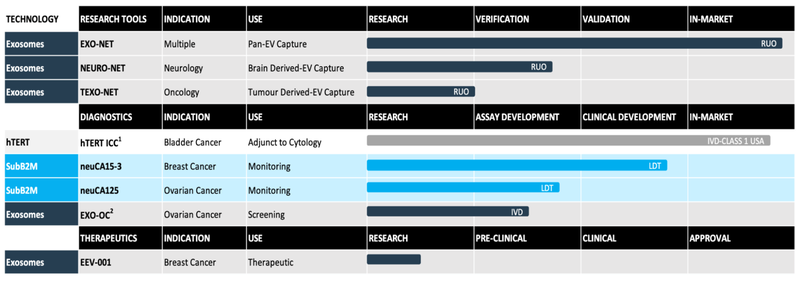
(Source)
And below is a timeline of potential catalysts:
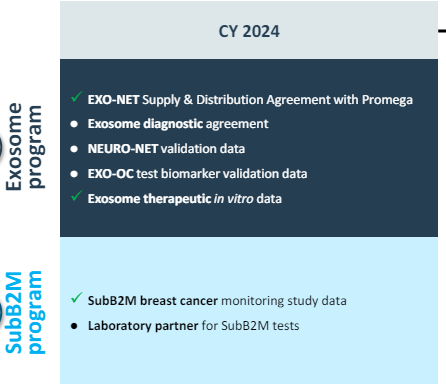
(Source)
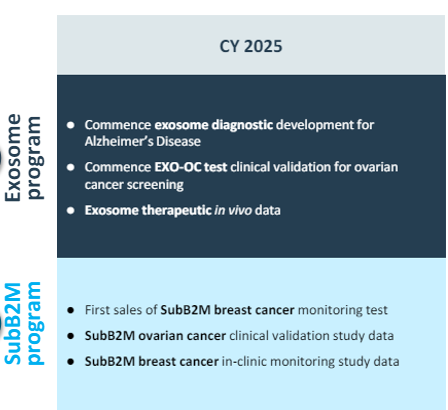
(Source)
It’s an expansive research pipeline that we think offers multiple chances for a re-rate.
In the near term (this year) we’re looking for:
Diagnostics
🔄 EXO-OC test biomarker validation data - (CY 2024)
🔄 Laboratory partner for SubB2M tests (breast cancer and ovarian cancer) - (CY 2024)
🔄 Exosome diagnostic agreement - (CY 2024)
Research Tools
🔲 Growing revenues from existing partnerships - (ongoing)
Neuro NET product
🔄 NEURO-NET validation data (Alzheimer’s test) - (CY 2024)
Next year we’re looking for:
Therapeutics
🔲 Exosome therapeutic in vivo (mice) data - (CY 2025)
Diagnostics
🔲 Start EXO-OC test clinical validation for ovarian cancer screening - (CY 2025)
🔲 First sales of SubB2M breast cancer monitoring test - (CY 2025)
🔲 SubB2M ovarian cancer clinical validation study data- (CY 2025)
🔲 SubB2M breast cancer in-clinic monitoring study data - (CY 2025)
Neuro NET product
🔲 Start exosome diagnostic development for Alzheimer’s Disease
So that we can follow the company’s progress over time and track our Investment, today we will be launching our IIQ Investment Memo, where we share:
- What IIQ does
- The macro theme for IIQ
- Our IIQ Big Bet
- What we want to see IIQ achieve
- Why we are Invested in IIQ
- The key risks to our Investment Thesis
- Our Investment Plan
Investment Memo for Inoviq (ASX:IIQ)
Shares Held: 1,150,000
Options Held: 575,000
Memo Opened: 12th June 2024
What does this company do?
Inoviq (ASX:IIQ) is a biotech company that is developing and commercialising an exosome technology platform for breast cancer, ovarian cancer and neurodegenerative disease (Alzheimer’s) diagnostics as well as a solid tumour (breast cancer) therapy.
What is the macro theme?
Exosomes present as one of the next major frontiers in the life sciences - as they play a key role in intercellular communication. The breast cancer diagnostic market is large as of 2024
We think IIQ has a good head start on potential competition as one of only a handful of companies with an advanced exosome technology platform.
Our Big Bet for IIQ
“IIQ re-rates to a +$500M market cap on commercialisation of its breast cancer test, its ovarian cancer test, neurodegenerative disease test and/or its solid tumour (breast cancer) therapy.”
NOTE: our “Big Bet” is what we HOPE the ultimate success scenario looks like for this particular Investment over the long term (3+ years). There is a lot of work to be done, many risks involved - just some of which we list in our IIQ Investment Memo. Success will require a significant amount of luck. There is no guarantee that our Big Bet will ever come true.
Why did we Invest in IIQ?
The 9 key reasons we Invested in IIQ:
- Going after big markets with potential breakthrough technology
- Strong board - the team from success story Polynovo
- Merchant Funds Management are the biggest shareholder
- Platform technology to deliver multiple “shots on goal”
- Very tight cap structure
- IIQ’s breast cancer test is more accurate than leading test
- Early stage moonshot to treat solid tumours
- Expansion of tests to include ovarian cancer and neurodegenerative diseases (Alzheimer’s)
- Large commercial opportunities from underlying technology
What do we expect the company to deliver?
Objective #1: Commercialise breast cancer test (diagnostics)
We want to see IIQ commercialise its breast cancer test (which has been shown to be more accurate than the ~$332BN capped Roche’s test) through the following additional milestones.
Milestones
🔲 Laboratory partner to bring to market SubB2M breast cancer test to market
🔲 Real world data to support clinical adoption
🔲 Partnership with major testing provider to commercialise at scale
Objective #2: Advance ovarian cancer tests (diagnostics)
IIQ has two ovarian cancer tests it is working on “EXO-OC” which is part of the company’s exosome work stream and a more advanced test called neuCA125 which is part of the SubB2M workstream and more similar to the breast cancer test above. The SubB2M ocarian cancer test is closer to market.
Milestones
🔲 EXO-OC test biomarker validation data
🔲 Commence EXO-OC test clinical validation for ovarian cancer screening
🔲 Laboratory partner to bring to market SubB2M ovarian cancer test to market
🔲 SubB2M ovarian cancer clinical validation study data
Objective #3: Advance neurodegenerative disease test (Alzheimer’s)
IIQ is working on a blood test for neurodegenerative diseases such as Alzheimer’s - a product call NEURO-NET.
Milestones
🔲 NEURO-NET validation data (Alzheimer’s test)
🔲 Start exosome diagnostic development for Alzheimer’s Disease
Objective #4: Advance solid tumour (breast cancer) therapy
This is the big blue sky opportunity for us. In 2025 we want to see IIQ progress its solid tumour (breast cancer) therapy to an in vivo (mice) study where we hope the effectiveness of the treatment can replicate the remarkable results from the test tube.
Milestones
🔲 Commence in vivo (mice) study
🔲 Report in vivo (mice) study results
Objective #5: Large commercial agreement for Exo-NET (Research tools)
This is the product and associated services that are already in-market. IIQ has signed a marketing agreement with major biotech product manufacturer and distributor Promega as well as ResearchDx a US contract diagnostics organisation to get the research tools into the hands of customers. The exosome industry is growing quickly and we want IIQ to sign material agreements.
Milestones
🔲 Material agreement #1
🔲 Material agreement #2
What could go wrong?
Competition risk
IIQ is not alone in the exosome diagnostics and therapeutics market. There are other companies such as the $336BN capped Thermo Fisher Scientific that have larger balance sheets and also provide exosome services and conduct exosome research.
Existing competitors or new entrants could make it harder for IIQ to gain commercial traction or may create superior products.
Technology risk
Exosomes are still an emerging field of scientific research and there may be undiscovered drawbacks to exosomal products - in particular as they apply to therapeutics.
For example, IIQ’s preclinical research on exosome therapies may not yield the desired results or may not be deemed acceptable in the eyes of a regulatory body.
Early stage biotech risk
This mainly applies to the solid tumour (breast cancer) therapy, which is currently in the preclinical phase of its development - noting that clinical validation for the diagnostic arm of IIQ’s business can still go wrong.
There are some standard risks that are associated with early stage biotechs, although the treatment appears effective in a test tube, this might not translate to humans. Key risks:
- The treatment is ineffective
- The treatment is not considered safe for human use
- Patient recruitment is delayed
- Ethics approval is delayed
Funding risk
Small caps often need to raise cash to fund their growth. Whilst IIQ is generating revenue now, it is still making a loss - i.e. it spends more cash than it brings in.
If IIQ is unable to develop a self-sustaining business model with positive operating cash flow, this could force IIQ to raise capital in the future, potentially at a discount to market prices to secure funds.
Market risk
There is always the possibility that broader market sentiment gets worse and shares as a whole trade lower, taking IIQ’s share price with it.
Alternatively, there could be further sector specific pain ahead. For example, the biotech sector sells down.
What is our Investment Plan?
Our Investment Plan for IIQ is to hold on to a majority of our position to see the company execute on its business strategy over the next two to three years.
If the company’s share price materially re-rates in the medium term due to a trial or commercialisation breakthrough, a macro triggering event or any other unknown reason, we may look to sell up to ~20% of our holding. See our general hold policy for more details.
General Information Only
S3 Consortium Pty Ltd (S3, ‘we’, ‘us’, ‘our’) (CAR No. 433913) is a corporate authorised representative of LeMessurier Securities Pty Ltd (AFSL No. 296877). The information contained in this article is general information and is for informational purposes only. Any advice is general advice only. Any advice contained in this article does not constitute personal advice and S3 has not taken into consideration your personal objectives, financial situation or needs. Please seek your own independent professional advice before making any financial investment decision. Those persons acting upon information contained in this article do so entirely at their own risk.
Conflicts of Interest Notice
S3 and its associated entities may hold investments in companies featured in its articles, including through being paid in the securities of the companies we provide commentary on. We disclose the securities held in relation to a particular company that we provide commentary on. Refer to our Disclosure Policy for information on our self-imposed trading blackouts, hold conditions and de-risking (sell conditions) which seek to mitigate against any potential conflicts of interest.
Publication Notice and Disclaimer
The information contained in this article is current as at the publication date. At the time of publishing, the information contained in this article is based on sources which are available in the public domain that we consider to be reliable, and our own analysis of those sources. The views of the author may not reflect the views of the AFSL holder. Any decision by you to purchase securities in the companies featured in this article should be done so after you have sought your own independent professional advice regarding this information and made your own inquiries as to the validity of any information in this article.
Any forward-looking statements contained in this article are not guarantees or predictions of future performance, and involve known and unknown risks, uncertainties and other factors, many of which are beyond our control, and which may cause actual results or performance of companies featured to differ materially from those expressed in the statements contained in this article. S3 cannot and does not give any assurance that the results or performance expressed or implied by any forward-looking statements contained in this article will actually occur and readers are cautioned not to put undue reliance on forward-looking statements.
This article may include references to our past investing performance. Past performance is not a reliable indicator of our future investing performance.

